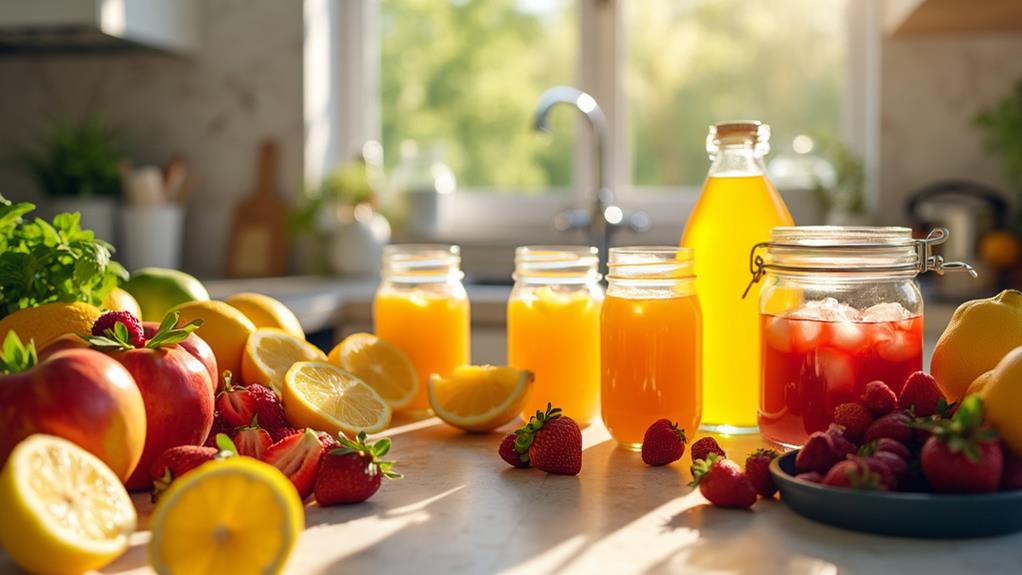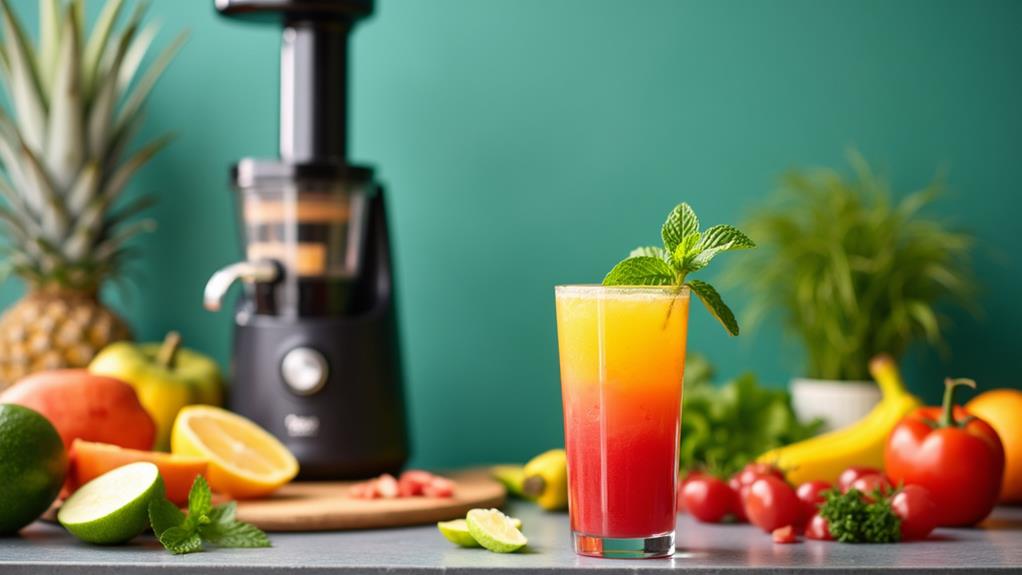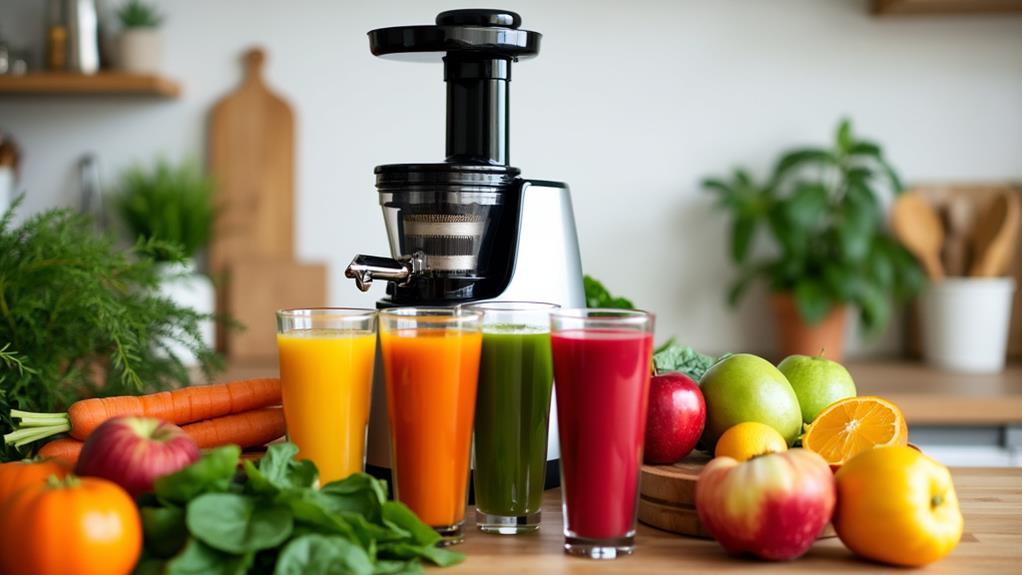Easy Guide to Making Lemon Juice
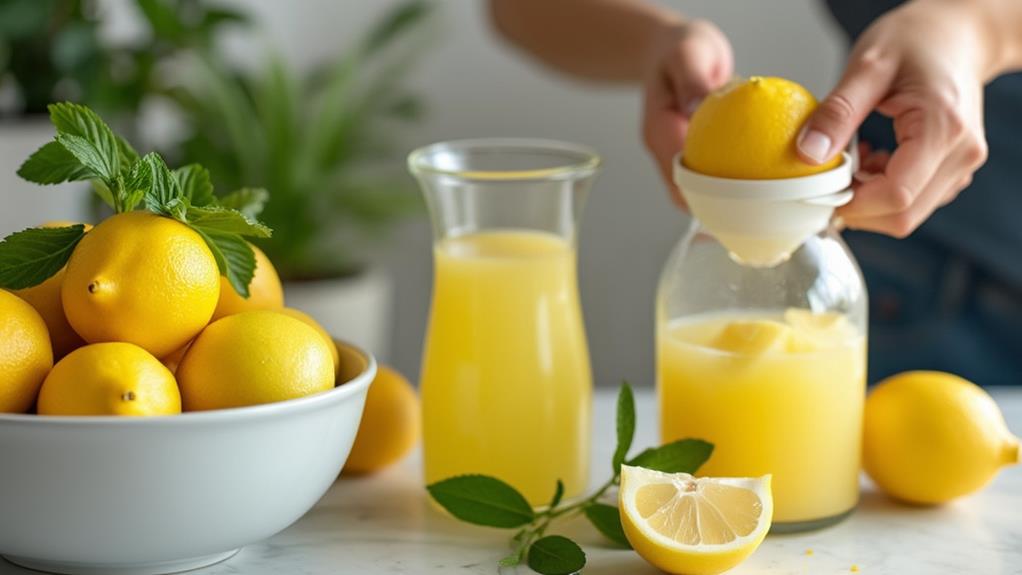
Making lemon juice might seem simple, but there's more to it than just squeezing a lemon. This guide will help you select the best lemons, use effective juicing techniques, and adjust the flavor to your taste. Whether you aim to boost your vitamin C intake or enjoy a refreshing drink, you'll find valuable tips here. Interested in the best way to store your homemade lemon juice or how to garnish it for a summer gathering? Let's explore the finer details.
Benefits of Lemon Juice
Lemon juice offers a range of health benefits that can significantly enhance your daily life. Rich in vitamin C, it serves as a powerful ally in boosting your immune system and combating infections. Even a small amount can provide a substantial portion of your daily vitamin C requirements, helping you stay healthy and energetic.
Beyond its immune-boosting properties, lemon juice aids digestion and supports weight loss. By promoting hydration and offering a low-calorie beverage option, it helps you maintain your health goals. The citric acid in lemon juice also plays a crucial role in preventing kidney stones and gallstones, making it a wise dietary addition.
Your skin will benefit from incorporating lemon juice into your routine. Its antioxidants improve skin appearance and contribute to overall skin health, giving you a natural glow. Additionally, lemon juice contains essential minerals like potassium, calcium, and iron, which are vital for maintaining various bodily functions.
Including lemon juice in your daily regimen is a simple yet effective way to boost your overall well-being. Don't underestimate the power of this citrus superstar!
Ingredients Needed
While we've explored the numerous benefits of lemon juice, let's now focus on what you'll need to prepare this refreshing beverage. For a simple lemonade recipe, start with 2 medium-sized lemons. Once juiced, you'll get about 1 to 1.5 cups of fresh lemon juice, forming the base of your drink.
Next, add 2 to 3 tablespoons of sugar to balance the tartness of the lemons. Adjust the amount to suit your taste. A pinch of salt is also essential; it enhances the flavor and balances the acidity, giving your lemonade a more rounded taste.
To dilute the lemon juice, add 1 cup of water. This not only makes the drink more palatable but also ensures it's refreshing and hydrating. Adjust the water quantity if you prefer a stronger or milder beverage. Finally, don't forget the ice cubes. Adding 3-4 pieces will chill your lemonade, making it particularly enjoyable on a hot day. With these ingredients, you're all set to make a delicious and invigorating lemonade.
Selecting Lemons
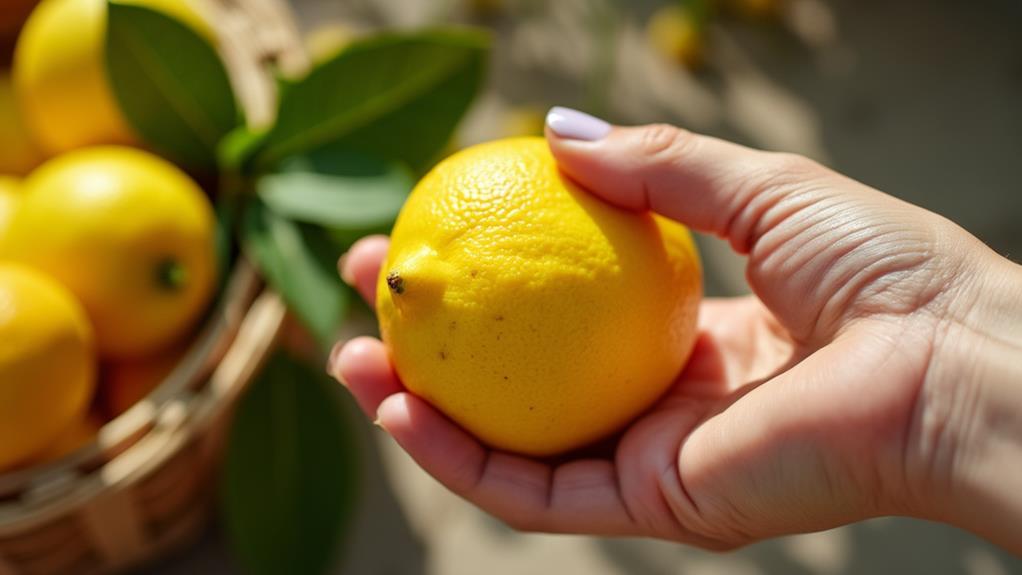
When preparing your lemonade, choosing the right lemons is crucial for maximum flavor and juiciness. Follow these tips to select the best lemons:
- Weight and Skin Texture: Opt for lemons that feel heavy for their size and have smooth, deep yellow skin. These are typically full of juice and fresh. Avoid lemons with a light or greenish hue, as they are usually more acidic and less flavorful.
- Variety: Meyer lemons are sweeter, making them ideal for a milder lemonade. For a tart flavor, choose Eureka or Lisbon lemons, which offer a more robust taste. Select based on your flavor preference.
- Firmness: Gently squeeze the lemons. Pick ones that feel slightly soft but not mushy, indicating they are ripe and juicy. Avoid hard lemons, as they usually lack the juiciness needed for a refreshing drink.
Preparing Lemons
Select heavy, smooth-skinned lemons that are deep yellow for optimal juice. Roll them on a flat surface for a few minutes to break down the membranes. Next, cut the lemons lengthwise and use a citrus press or electric juicer to extract the juice efficiently.
Selecting Fresh Lemons
To make the best lemon juice, you need to start by selecting the freshest and ripest lemons. The quality of your juice will significantly depend on this choice. Here are some essential tips to help you pick the right lemons:
- Weight and Firmness: Choose lemons that feel heavy for their size, as they usually have more juice. Look for ones that are firm yet slightly soft when squeezed. Avoid lemons that are overly hard, as they may not yield much juice.
- Skin Appearance: Select lemons with smooth, deep yellow skin. This is a sign of freshness and ripeness. Avoid lemons with blemishes, wrinkles, or green spots, as these indicate under-ripeness or poor quality.
- Variety: The type of lemon matters. Meyer lemons are sweeter and less acidic, ideal if you prefer a milder flavor. For a more traditional tart flavor, opt for Eureka or Lisbon lemons.
Optimal Juicing Techniques
Preparing lemons for juicing is a crucial step that can greatly influence the flavor and yield of your juice. Start by selecting heavy, smooth-skinned lemons with a deep yellow color. Meyer lemons are sweeter, while Eureka and Lisbon lemons offer more tartness. Roll the lemons on a flat surface for 1-2 minutes to break down the membranes inside, making it easier to extract more juice.
Cut the lemons lengthwise to optimize juice extraction. Use a citrus press or an electric juicer to make the process faster and more efficient. Squeeze the juice into a bowl and use a strainer to filter out seeds and pulp, ensuring a smoother consistency.
Consider freezing the lemons before juicing; it makes them easier to squeeze. Pressing them firmly will improve the overall juice yield.
Here's a quick guide to evoke some juicing emotions:
| Step | Action | Emotion |
|---|---|---|
| 1 | Choose the right lemons | Excitement |
| 2 | Roll on a flat surface | Anticipation |
| 3 | Cut lengthwise | Satisfaction |
| 4 | Squeeze and strain | Accomplishment |
| 5 | Enjoy your fresh juice | Joy |
Follow these steps for a delicious, revitalizing lemon juice ready in no time!
Juicing Methods
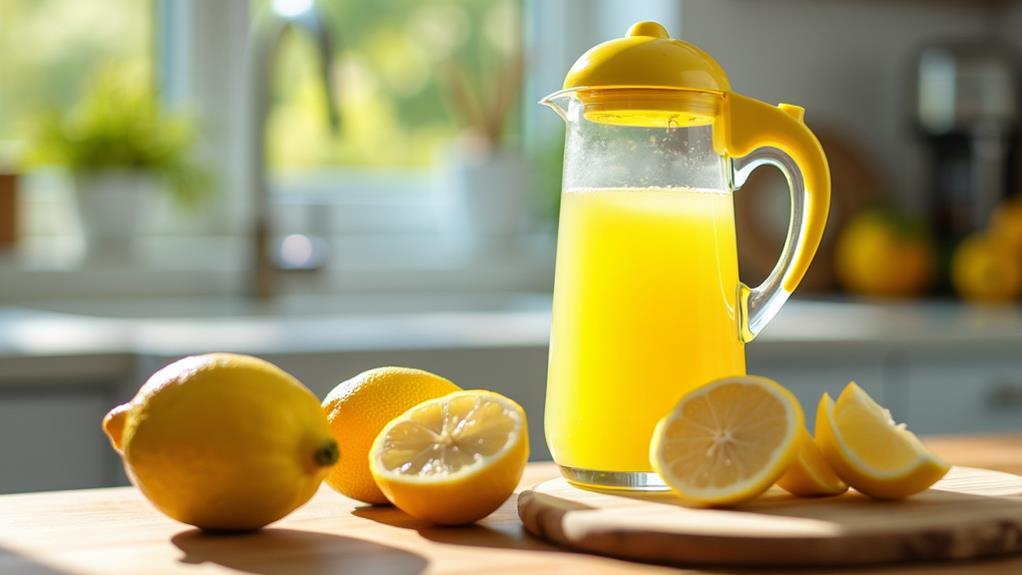
When it comes to juicing methods, you have several effective options. You can use manual techniques like rolling and squeezing lemons to optimize juice extraction, or opt for an electric juicer for efficiency and minimal mess. Cutting lemons lengthwise and straining through a fine mesh sieve will also ensure you get the smoothest juice possible.
Manual Juicing Techniques
For optimal manual juicing results, start by rolling the lemon on a flat surface for 1-2 minutes to break down the internal membranes, enhancing juice extraction. Cut the lemon lengthwise for better access to juice-filled sections, ensuring efficient squeezing.
Select a citrus press or manual juicer to extract juice effectively while minimizing pulp and seeds. Follow these steps for maximum juice yield:
- Prepare the Lemon: Microwave the lemon for 10-15 seconds if it's hard to squeeze. This softens it and increases juice yield.
- Juicing Process: Use a citrus press or manual juicer to squeeze the lemon halves, pressing firmly to extract the most juice.
- Final Extraction: Press the lemon halves against the juicer again to extract any remaining juice.
These techniques ensure every drop of juice is extracted, making your recipe as flavorful as possible.
Electric Juicer Benefits
Electric juicers provide a hassle-free and efficient method for extracting lemon juice, making the process much quicker than manual methods. They significantly reduce the manual effort required, making them ideal for those short on time or needing to juice large quantities.
One of the primary benefits of electric juicers is their ability to yield more juice from each lemon. By applying consistent pressure, these devices ensure maximum juice extraction, minimizing waste. Many electric juicers also come with built-in strainers that separate pulp and seeds, resulting in a smooth, pulp-free juice.
Additionally, electric juicers often feature adjustable settings to control the amount of pulp in the juice, allowing for customization based on personal preference. This not only saves time in food preparation but also makes them a practical choice for those who frequently need large amounts of lemon juice for recipes or beverages.
Optimal Juice Extraction
To achieve optimal juice extraction from lemons, employing the right techniques and tools is essential. Start by rolling the lemons on a flat surface for 1-2 minutes, as this breaks down the internal membranes and releases more juice.
Next, cut the lemons lengthwise rather than crosswise. This exposes more surface area, enhancing juice extraction and making it easier to maximize yield.
For further efficiency, use a citrus press or an electric juicer. These tools optimize juice yield while minimizing pulp and seed inclusion, making the process faster and more effective.
Key tips to remember:
- Roll the lemons: Spend 1-2 minutes rolling them to break down internal membranes.
- Cut lengthwise: Slice your lemons lengthwise for better juice extraction.
- Use proper tools: Employ a citrus press or electric juicer for improved efficiency and minimal waste.
Mixing and Flavoring
To enhance the flavor of your lemon juice, start with simple adjustments. Add 1 teaspoon of sugar per lemon to balance the acidity, creating a smoother taste. Dilute the juice with up to 1 cup of water per lemon to adjust the tartness without overpowering the natural flavor.
For a more complex taste, blend in a small piece of lemon peel, about a quarter of a lemon, to introduce a subtle aromatic essence. For a refreshing twist, incorporate fresh herbs like mint or basil. These herbs complement the citrus and create a unique and invigorating beverage experience.
Serving Suggestions

For a refreshing treat, pour your freshly prepared lemon juice over ice, especially on hot summer days. Enhance the flavor and visual appeal by garnishing with lemon slices or mint leaves. For an extra twist, add sparkling water to create a fizzy, energizing drink perfect for social gatherings.
Ideal Summer Beverage
A chilled glass of lemon juice with ice cubes offers refreshing hydration on hot summer days, making it ideal for outdoor gatherings and picnics. Lemonade is both delicious and easy to prepare, allowing you to quickly create a rejuvenating drink. To elevate your summer beverage, try these serving suggestions:
- Sparkling Lemonade: Mix lemon juice with sparkling water for a fizzy twist, adding delightful effervescence to the classic lemonade.
- Flavor Infusions: Enhance the flavor by adding fresh berries or herbs like basil or thyme. This not only boosts taste but also adds a colorful presentation to impress your guests.
- Perfect Pairings: Serve lemonade with light summer dishes like salads, grilled vegetables, or seafood. The citrusy zing complements these foods perfectly, enhancing your meal.
Garnishing Techniques
Enhance your lemon juice with simple garnishing techniques that add both visual appeal and flavor. Start by placing fresh lemon slices or wedges on the rim of the glass. This not only looks refreshing but also allows guests to add extra zest if they wish.
For an aromatic touch, add a sprig of fresh mint or basil directly into the drink. These herbs pair beautifully with the citrus, creating a more complex and inviting flavor profile. For a pop of color and added nutritional benefits, toss in a few colorful berries, such as strawberries or blueberries, which provide a lively contrast against the yellow lemon juice.
To elevate your presentation further, use a decorative straw or a cocktail stirrer. These small enhancements can turn a simple glass of lemon juice into a festive beverage perfect for gatherings. For a touch of elegance, rim the glass with sugar or salt before pouring the lemon juice. This adds a delightful burst of flavor with every sip and makes the drink feel extra special. By using these garnishing techniques, your lemon juice becomes a true visual and sensory delight.
Storage Tips
Proper storage of lemon juice is essential for maintaining its freshness and flavor. Follow these tips to ensure your lemon juice stays as delightful as when you first squeezed it.
Storage Tips:
- Refrigeration: Store fresh lemon juice in the refrigerator for up to 3 days. Use a resealable container and label it with the date to track its freshness. Ensure the container is sealed tightly to prevent the juice from absorbing unwanted odors from other foods in the fridge.
- Freezing: For longer storage, freeze the lemon juice in ice cube trays or small resealable containers. This can extend its shelf life up to 4 months. Thaw the frozen juice at room temperature or use a microwave on a low setting. For the best flavor, consume it promptly after thawing to avoid any bitterness.
- Stirring: Before using stored lemon juice, always stir it well. This ensures that any settled components are mixed evenly, maintaining the desired consistency and taste.
These storage tips will help you enjoy fresh and flavorful lemon juice whenever you need it!
Nutritional Information

Lemon juice offers significant nutritional benefits while being low in calories. A typical serving contains approximately 69 calories, primarily from carbohydrates (18g), with minimal fat content (0.1g). This makes it an excellent choice for those monitoring their calorie intake but still wanting a flavorful beverage.
Each serving provides around 599mg of sodium and 0.5mg of potassium, essential electrolytes for maintaining hydration and bodily functions. Additionally, it contains small amounts of calcium (11mg) and iron (0.01mg), contributing modestly to your daily nutrient intake.
Notably, lemon juice is rich in Vitamin C, a potent antioxidant that enhances the immune system. Regular consumption can aid digestion and support detoxification, making it a valuable addition to your diet.
The sugar content in lemon juice is about 18g per serving, so you may want to adjust the sweetness to your preference. Despite its low calorie count, lemon juice is rich in crucial nutrients, offering both refreshment and health benefits.
Reader Feedback
Readers have been raving about the recipe's effectiveness and the revitalizing taste of the lemon juice. Many have found the instructions clear and concise, making it easy to replicate at home. Here's what they're saying:
- Balanced Flavor: Several readers suggest adjusting the amount of lemon peel used. If you find the juice too sour, try reducing the peel for a more balanced flavor. This small tweak can greatly improve the overall taste.
- Visual Appeal: The recipe creates a beautiful presentation, especially when garnished with lemon slices. This simple addition enhances the drink's appearance and makes it more inviting.
- Community Engagement: The comment section is buzzing with activity. Users are sharing personal variations, offering tips, and rating the recipe. This sense of community adds an extra layer of enjoyment as you explore different ways to make your lemon juice uniquely yours.
When you try this recipe, be sure to consider these reader suggestions to perfect your lemon juice. The blend of personal experiences and tips ensures you get the most out of every drop.

